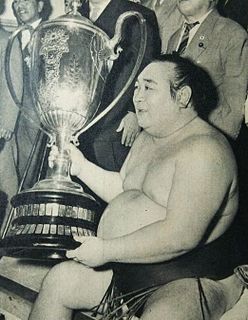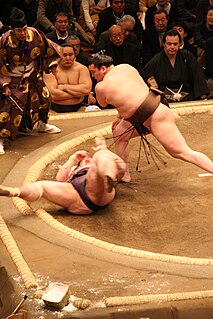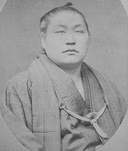
A rikishi (力士) sumotori or, more colloquially, sumosan, is a professional sumo wrestler. Rikishi are expected to live according to centuries-old rules and, although there are some exceptions, most come from Japan, where sumo is practiced exclusively. Participation in official tournaments is the only means of marking achievement in sumo and the rank of an individual rikishi is based solely on official wins.

Inazuma Raigorō was a sumo wrestler from Inashiki, Ibaraki Prefecture, Japan. He was the sport's 7th yokozuna. Inazuma means lightning in Japanese.

Nishinoumi Kajirō I was a sumo wrestler from Sendai, Kagoshima Prefecture, Japan. He was the sport's 16th yokozuna, and the first to be officially listed as such on the banzuke ranking sheets, an act which strengthened the prestige of yokozuna as the highest level of achievement in professional sumo.

Ōzutsu Man'emon was a sumo wrestler from Shiroishi, Miyagi Prefecture, Japan. He was the sport's 18th yokozuna.

Hitachiyama Taniemon was a sumo wrestler from Mito, Ibaraki Prefecture, Japan. He was the sport's 19th yokozuna from 1903 till 1914. His great rivalry with Umegatani Tōtarō II created the "Ume-Hitachi Era" and did much to popularise sumo. He is remembered as much for his exploits in promoting the sport as for his strength on the dohyō. In his later years as head coach of Dewanoumi stable he trained hundreds of wrestlers, including three yokozuna. Many consider him the most honorable yokozuna in sumo history, which earned him the nickname "Kakusei" (角聖), or "sumo saint".

Umegatani Tōtarō II was a sumo wrestler from Toyama City, Toyama Prefecture, Japan. He was the sport's 20th yokozuna. Umegatani had a great rivalry with yokozuna Hitachiyama Taniemon. Their era was known as the Ume-Hitachi Era and it brought sumo to heights of popularity never before seen in the Meiji period.

Wakashima Gonshirō was a sumo wrestler from Ichikawa, Chiba Prefecture, Japan. He was the sport's 21st yokozuna.

Tachiyama Mineemon was a sumo wrestler from Toyama City, Toyama Prefecture, Japan. He was the sport's 22nd yokozuna. He was well known for his extreme strength and skill. He won 99 out of 100 matches from 1909 to 1916, and also won eleven top division tournament championships.

Musashiyama Takeshi was a sumo wrestler from Yokohama, Kanagawa Prefecture, Japan. He was the sport's 33rd yokozuna. He had a rapid rise through the ranks, setting several youth records, and was very popular with the public. However he did not fulfill his great potential at sumo's highest rank, missing many matches because of injury and winning no tournaments.

Minanogawa Tōzō, also known as Asashio Kyojiro, was a sumo wrestler from Tsukuba, Ibaraki, Japan. He was the sport's 34th yokozuna.

Tamanoumi Masahiro, was a sumo wrestler, born in Aichi, Japan. He was the sport's 51st yokozuna. Making his professional debut in 1959, he reached the top makuuchi division in 1964. He won six tournament championships and was runner-up in 12 others. Earlier in his career he also earned six special prizes and four gold stars. He was promoted to yokozuna simultaneously with his friend and rival Kitanofuji in January 1970 and the two men represented the dawning of a new era after the dominance of Taihō. He died suddenly in October 1971 after a delayed appendectomy.

Chiyonoyama Masanobu was a sumo wrestler from Fukushima, Hokkaidō, Japan. He was the sport's 41st yokozuna from 1951 until 1959. He is regarded as the first "modern" yokozuna in that he was promoted by the Japan Sumo Association itself and not the House of Yoshida Tsukasa. He was the first yokozuna from Hokkaidō, which was also the birthplace of the subsequent yokozuna Yoshibayama, Taihō, Kitanoumi and his own recruits Kitanofuji and Chiyonofuji. After his retirement he left the Dewanoumi group of stables and founded Kokonoe stable in 1967.He died in 1977 while still an active stablemaster.

Kagamisato Kiyoji was a sumo wrestler from Aomori Prefecture, Japan. He was the sport's 42nd yokozuna.

Terao Tsunefumi is a Japanese former sumo wrestler. He was born in Tokyo, but brought up in Kajiki, Aira District, Kagoshima, Japan. He fought out of Izutsu stable. The highest rank he reached was sekiwake. Despite his relatively light weight he had an extremely long career, spanning 23 years from 1979 until 2002, and was known as the "iron man" of sumo. He is now the head coach of Shikoroyama stable.

Tamanoshima Arata is a former sumo wrestler from Izumizaki, Fukushima, Japan. A former amateur champion, he made his professional debut in 1998, reaching the top makuuchi division at the end of 2000. He was twice runner-up in a tournament, and earned six special prizes and two gold stars during his career. His highest rank was sekiwake. He wrestled for Kataonami stable.

Tsurugamine Akio, real name Akio Fukuzono, was a sumo wrestler from Aira, Kagoshima, Japan. His highest rank was sekiwake. He was twice runner-up in a tournament and won 14 special prizes, including a record ten for Technique, and earned ten gold stars for defeating yokozuna. After his retirement he was the head of Izutsu stable and coached two of his sons, Sakahoko and Terao, to the top division.
The following are the events in professional sumo during 2013.

Arawashi Tsuyoshi is a professional sumo wrestler from Ulan Bator, Mongolia. He made his professional debut in November 2002. He is the 21st Mongolian to reach the top makuuchi division, which he achieved in May 2014. His 68-tournament rise through the ranks is the second-slowest progress for a foreign wrestler after Sentōryū. He has three kinboshi or gold stars for defeating yokozuna. His highest rank has been maegashira 2.























